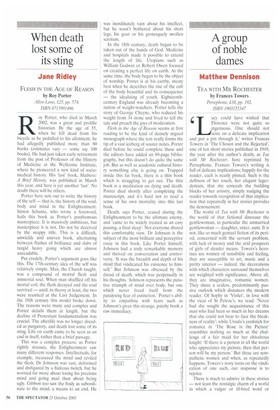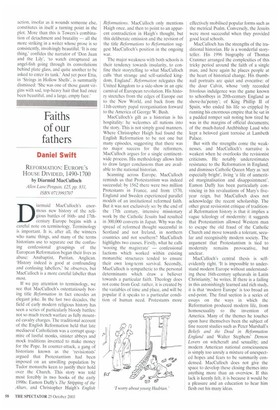A group of noble dames
Matthew Dennison
TEA WITH MR ROCHESTER by Frances Towers Persephone, £10, pp. 192, ISBN 1903155347 C u cy could have wished that
Florence were not quite so Florence were not quite so ingenuous. One should not seize on a delicate implication and put a pin through it,' writes Frances Towers in 'The Chosen and the Rejected', one of ten short stories published in 1949, the year after the author's death, as Tea with Mr Rochester, here reprinted by Persephone. Frances Towers's writing is full of delicate implications; happily for the reader, each is neatly pinned. Such is the deftness of her touch, her elegant legerdemain, that she conceals the building blocks of her artistry, simply nudging the reader towards recognition of that implication that repeatedly in her stories provides the denouement.
The world of Tea with Mr Rochester is the world of that fictional dinosaur the gentlewoman, in particular the unmarried gentlewoman — daughter, sister, aunt. It is not, like so much genteel fiction of its period, concerned with the servant problem, with lack of money and the arid prospects of girls of slender means. Towers's heroines are women of sensibility and feeling, they are susceptible to art, music and a pretty interior — indeed, the decorations with which characters surround themselves are weighted with significance. Above all, they are imaginative, romantic women. They share a sexless, predominantly passive outlook which distances the modern reader. Of Sophy in 'Violet', in love with the vicar of St Petroc's, we read: 'Never had she sought the acquaintance of this man who had been so much in her dreams that she could not bear to face the bleakness of reality'; while Ursula's yardstick for romance in 'The Rose in the Picture' resembles nothing so much as the challenge of a fair maid for her chivalrous knight: 'If there is a person in all the world who appreciates my picture, then that person will be my person.' But these are sympathetic women and when, as repeatedly happens, Towers's story turns on the vindication of one such, our response is to rejoice.
There is much to admire in these stories — not least the nostalgic charm of a world in which a vulgar or ill-bred word or action, insofar as it wounds someone else, constitutes in itself a turning point in the plot. More than this is Towers's combination of detachment and brutality — all the more striking in a writer whose prose is so consistently, involvingly beautiful. 'It is one thing,' confides the narrator of 'Don Juan and the Lily', 'to watch enraptured an angel-fish going through its convolutions behind plate glass, and quite another to be asked to enter its tank.' And yet poor Etta, in 'Strings in Hollow Shells', is summarily dismissed: 'She was one of those gaunt virgins with sad, top-heavy hair that had once been beautiful, and a large, empty face.'



































































































 Previous page
Previous page